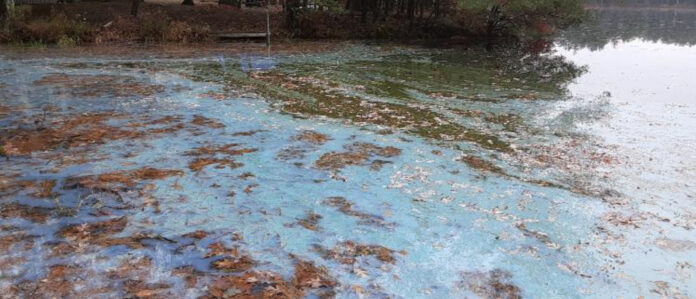A potential cyanobacteria bloom has been observed on Baxter Lake. The bloom was first reported on 10/25/2022, appearing as dense blue clouds of material along parts of the shoreline. NHDES has not yet collected samples.
This is not an official advisory. However, contact with the water should be avoided, especially keeping children and pets out. This message serves as an informational alert for lake-goers to be on the lookout for accumulations of cyanobacteria, especially nearshore of the lake.
Advisories are issued once samples are collected and cell concentrations of cyanobacteria are confirmed to exceed 70,000 cells/mL of lake water.
NHDES advises lake users to avoid contact with the water in areas experiencing elevated cyanobacteria cell conditions, also known as a bloom. NHDES also advises pet owners to keep their pets away from cyanobacteria blooms.
Cyanobacteria are natural components of water bodies worldwide, though blooms and surface scums may form when excess nutrients are available to the water. Some cyanobacteria produce toxins that are stored within the cells and may be released upon cell death. Toxins can cause both acute and chronic health effects that range in severity.
Acute health effects include irritation of skin and mucous membranes, tingling, numbness, nausea, vomiting, seizures and diarrhea. Chronic effects may include liver and central nervous system damage. Be cautious of lake water that has a surface scum, changes colors, or appears to have green streaks or blue-green flecks aggregating along the shore.
Visit the NHDES Harmful Algal and Cyanobacteria Bloom Program website for photos and more information about cyanobacteria here. Check out the Beach Mapper website for updates on cyanobacteria advisories.
If you notice anything resembling cyanobacteria, please refrain from wading, swimming, or drinking the water. Keep all pets out of the water and contact NHDES immediately. Please call NHDES to report a cyanobacteria bloom at (603) 848-8094 or email HAB@des.nh.gov.
